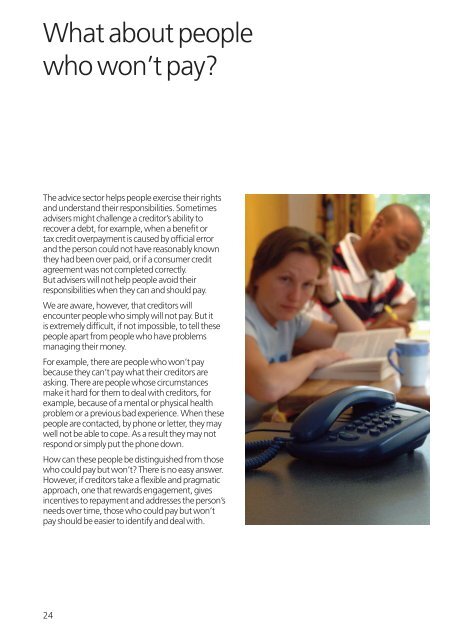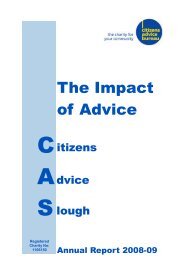Do the right thing, Adviser's and creditors experience of best practice ...
Do the right thing, Adviser's and creditors experience of best practice ...
Do the right thing, Adviser's and creditors experience of best practice ...
- No tags were found...
You also want an ePaper? Increase the reach of your titles
YUMPU automatically turns print PDFs into web optimized ePapers that Google loves.
What about peoplewho won’t pay?The advice sector helps people exercise <strong>the</strong>ir <strong>right</strong>s<strong>and</strong> underst<strong>and</strong> <strong>the</strong>ir responsibilities. Sometimesadvisers might challenge a creditor’s ability torecover a debt, for example, when a benefit ortax credit overpayment is caused by <strong>of</strong>ficial error<strong>and</strong> <strong>the</strong> person could not have reasonably known<strong>the</strong>y had been over paid, or if a consumer creditagreement was not completed correctly.But advisers will not help people avoid <strong>the</strong>irresponsibilities when <strong>the</strong>y can <strong>and</strong> should pay.We are aware, however, that <strong>creditors</strong> willencounter people who simply will not pay. But itis extremely difficult, if not impossible, to tell <strong>the</strong>sepeople apart from people who have problemsmanaging <strong>the</strong>ir money.For example, <strong>the</strong>re are people who won’t paybecause <strong>the</strong>y can’t pay what <strong>the</strong>ir <strong>creditors</strong> areasking. There are people whose circumstancesmake it hard for <strong>the</strong>m to deal with <strong>creditors</strong>, forexample, because <strong>of</strong> a mental or physical healthproblem or a previous bad <strong>experience</strong>. When <strong>the</strong>sepeople are contacted, by phone or letter, <strong>the</strong>y maywell not be able to cope. As a result <strong>the</strong>y may notrespond or simply put <strong>the</strong> phone down.How can <strong>the</strong>se people be distinguished from thosewho could pay but won’t? There is no easy answer.However, if <strong>creditors</strong> take a flexible <strong>and</strong> pragmaticapproach, one that rewards engagement, givesincentives to repayment <strong>and</strong> addresses <strong>the</strong> person’sneeds over time, those who could pay but won’tpay should be easier to identify <strong>and</strong> deal with.24




![Annual review [ 1.4 MB] - Citizens Advice](https://img.yumpu.com/50679529/1/190x135/annual-review-14-mb-citizens-advice.jpg?quality=85)

![Help for helping your residents [ 2.4 MB] - Citizens Advice](https://img.yumpu.com/48848542/1/185x260/help-for-helping-your-residents-24-mb-citizens-advice.jpg?quality=85)







